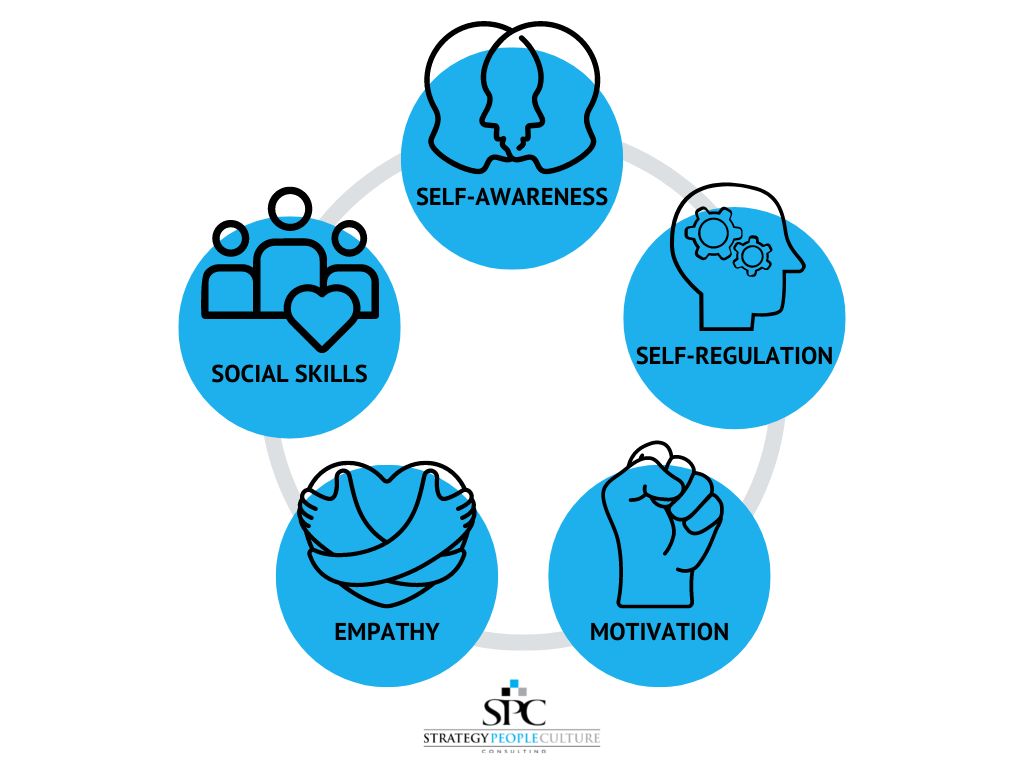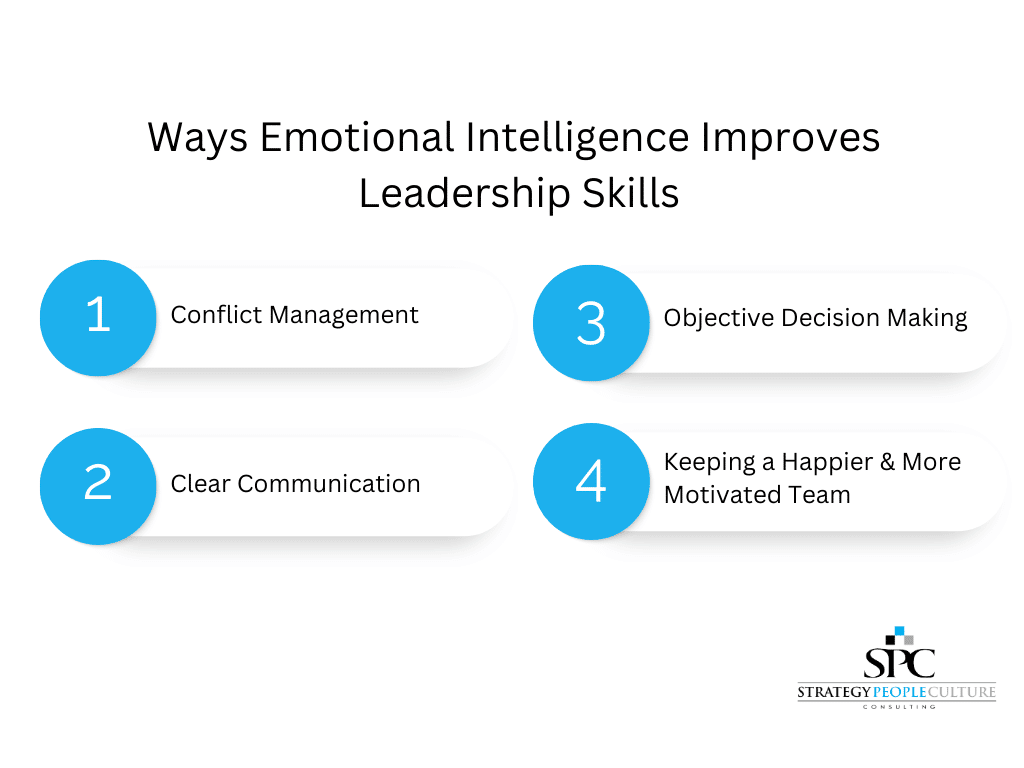Why Emotional Intelligence is Important in Leadership

Technical know-how and understanding your business are undoubtedly important to leading a team. However, surprisingly, these are not always the most important qualities of a good leader. In fact, in many situations, people may be promoted to a leadership role due to their expertise, only to flounder and wonder why.
Often, this is because they lack a focus on what the best leaders have – a high degree of emotional intelligence. It is a key component to developing a strong executive presence. In fact, emotional intelligence may be one of the most important factors determining whether a leader will excel in their role.
What is Emotional Intelligence?

Emotional Intelligence is the ability to accurately judge and respond to your own emotions and those of the others around you. It is a relatively new concept in the fields of psychology and business. The term was formally established in 1990 by psychology professors John D. Mayer and Peter Salovey of the University of New Hampshire and Yale, respectively.
According to Mayer, emotional intelligence is made up of three facets:
- The ability to accurately perceive your own and others’ emotions.
- The ability to understand the signals that emotions send about relationships.
- The ability to manage your own and others’ emotions.
Daniel Goleman of Rutgers University most famously outlined the importance of emotional intelligence in the workplace. In 1998, he contributed his findings to the Harvard Business Review in the article, “What Makes a Leader?“
While Mayer’s definition describes what emotional intelligence does, Goleman elaborates on the personal attributes that enable a person to develop and use it.
What are the Five Main Components of Emotional Intelligence?
According to Goleman, emotional intelligence is made up of five components. The interplay of these traits makes someone “emotionally intelligent.”
1. Self-awareness

Self-awareness is just like it sounds; knowing what you are feeling and why. This includes knowledge of your own strengths and weaknesses. The better you know these, the more accurately you will be able to judge in which situations you should ask for or offer your help. This lets you put yourself to best use within a team and most effectively benefit from others’ strengths.
Acknowledging times that your emotions got in the way and you got carried away lets you learn from those experiences and make better choices in the future. Likewise, keeping in mind what you are good at will allow you to play to your strengths. This is especially important in management, where making accurate calls about your own and your team’s strengths and weaknesses will ensure each person is put to their best use.
2. Self-regulation

Often, we react impulsively to strong feelings. Self-regulation is the ability to take a step back, recognize our feelings, and separate emotions from what our reactions to them will be. Anger and other strong, negative emotions can negatively affect decision-making and create resentment from those whom you are leading. Self-regulation helps you to see and act upon any given situation more objectively. For example, not getting lost in feelings of disappointment will allow you to carefully consider why that disappointing event occurred and more accurately assess how to prevent it in the future.
3. Motivation

Everyone has their own motivation, and emotionally intelligent people learn to understand their motivations and those of the people around them. Emotionally intelligent leaders often find their motivations come from an internal desire to achieve and go beyond a desire for money, power, status, or other external gains. As reported in the Harvard Business Review, this inner drive to achieve for achievement’s sake will lead a person with emotional intelligence to pursue their goals with energy and purpose. These people enjoy a challenge and feel great satisfaction in finding a solution; they like to learn and explore new approaches. Since the process, challenge, and resulting achievement are what matter to them, work is not a long slog to their desired external reward, whether that be a high salary, either top or bottom-line growth in the business, or an impressive-sounding title.
In leadership, your level of motivation and energy for work sets the tone for the entire organization. Note that motivation and energy apply to all personality types, from the most extreme introvert to the most over-the-top extrovert. A leader who sets a high standard and relentlessly pursues reaching it will encourage others to follow in their footsteps. Optimism and passion are inspirational!
4. Empathy

Empathy is popularly understood as the ability to share in others’ emotions as if they were your own. However, this is only one type of empathy, called emotional empathy. There is another type of empathy known as cognitive empathy. Cognitive empathy doesn’t necessarily involve sharing in the other person’s emotions – just understanding what they are feeling and how it affects them. This type of empathy can be developed and improved.
Empathy is important to situational awareness, and especially to situational awareness in addressing workplace diversity issues. As we discussed in our last blog article, understanding how people’s cultural experiences inform how they interpret a situation is vital to ensure no one feels alienated or dismissed. That is, empathy and an informed situational awareness make sure everyone feels heard and respected.
5. Social Skills

It’s often said that success is based not on what you know but who you know. It’s no surprise, then, that social skills are described by the Harvard Business Review as “friendliness with purpose.” Social skills inform a person’s ability to adjust behavior to best fit different contexts – for example, according to the Harvard Business Review, “good persuaders know when to make an emotional plea, for instance, and when an appeal to reason will work better.”
Knowing how to find common ground, build rapport and form lasting interpersonal relationships is important for a leader to maintain an atmosphere of open communication in their workplace.
What is the Link Between Emotional Intelligence and Higher Financial Performance?
Research proves that emotional intelligence in corporate leadership correlates not only to better job performance but also to better overall financial performance.
In his study, Goleman found that “emotional intelligence proved to be twice as important” as other skills for all employees and for what he called “star performers” in leadership. “…Nearly 90% of the difference in their profiles was attributable to emotional intelligence factors rather than cognitive abilities.”
In fact, studies support a direct correlation between higher financial performance and leaders with emotional intelligence. A 1996 study cited by Goleman “found that when senior managers had a critical mass of emotional intelligence capabilities, their divisions outperformed yearly earnings goals by 20%. Meanwhile, division leaders without that critical mass underperformed by almost the same amount.”
In a more recent study by the consulting research firm KRW International, employees were asked to rate their bosses in the categories of integrity, responsibility, forgiveness, and compassion to measure traits associated with their emotional intelligence. Employers who scored highest reported an asset return that was five times higher than those who scored lowest. The world-renowned consulting firm, McKinsey & Company, noted in 2020, 75% of people reported the most stressful part of their job was their immediate boss.
What Are Ways Emotional Intelligence Improves Leadership Skills?
Emotionally intelligent leaders reap such rewards for their companies because they can apply their emotional intelligence to their management style. Emotionally intelligent leaders are more effective at these key responsibilities:

1. Conflict Management
Using empathy and social skills, emotionally intelligent leaders use their understanding of others to guide them in the positive direction required to meet business objectives. Combined with self-awareness and self-regulation, a leader will be able to keep his or her own frustrations in check while mitigating the emotional reactions or clashes of others.
2. Clear Communication
Emotionally intelligent leaders put their expertise to use better by effectively communicating their ideas. They also know how to draw out each team member’s best efforts and expertise for the benefit of the team through listening and understanding.
3. Objective Decision Making
Through self-awareness and situational awareness, emotionally intelligent leaders best organize their teams and tasks so everyone is using their skills to their fullest potential and no one is assigned to a task that they will be weak in.
4. Keeping a Happier & More Motivated Team
As we saw in the previous article about power vs. influence, a team that feels heard and appreciated will be more productive and more committed to the company long-term.
What are Ways to Develop Emotional Intelligence?
Emotional intelligence is a skill, and it can be improved through personal development. The most effective way to do this is through both internal review – learning to recognize and evaluate your own emotions – and external review. According to Harvard University, feedback from others about “how you respond to difficult situations, how adaptable or empathetic you are, and/or how well you handle conflict” is vital to developing a sense of self-awareness and emotional intelligence.
An executive coach is a great source for this feedback. Here at Strategy People Culture, we can guide you through improving your emotional intelligence, as well as how to best apply it in your own approach to the workplace. To learn more about our leadership coaching opportunities, call 833-762-5772 or email us at info@strategypeopleculture.com for more information.
